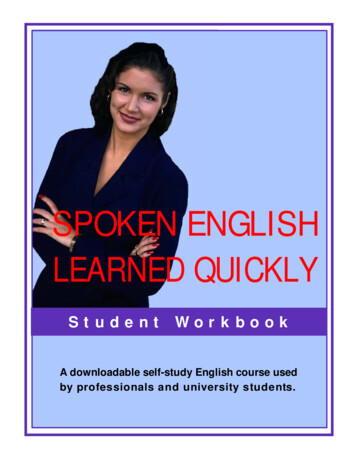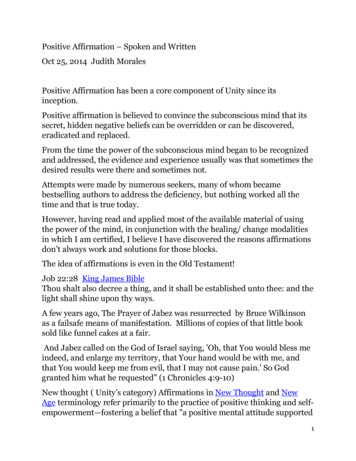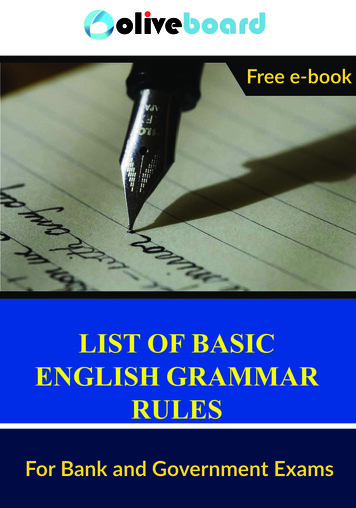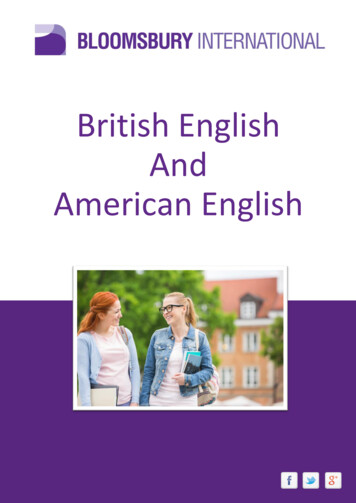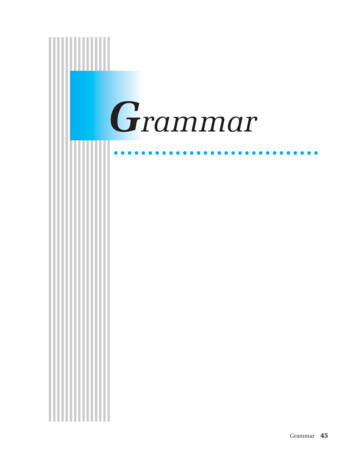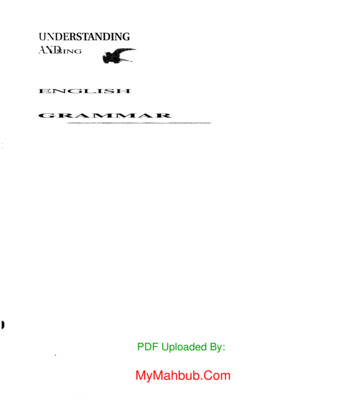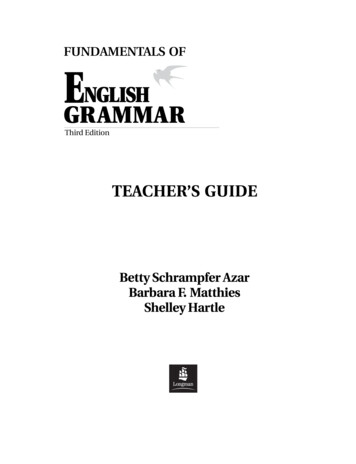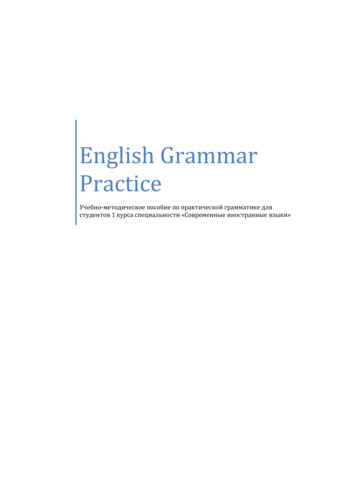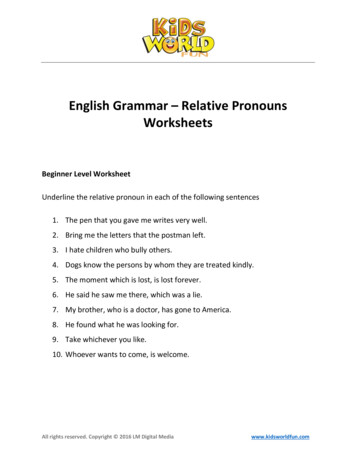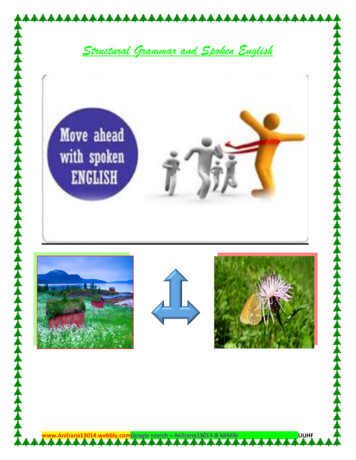
Transcription
Structural Grammar and Spoken Englishwww.Anilrana13014.webbly.comGoogle search Anilrana13014 & k8449rUUHF
9. Structural Grammar and Spoken English (NC) 2 (1 1)Structural Grammar: Introduction of Word Classes; Structure of Verb in English; Usesof Tenses; Study of Voice; Study of Conjunctions and Prepositions; Sentence Patternsin English. Spoken English: Conversations of different situations in everyday life; theconcept of stress; stress shift in words and sentences; silent letters in words andpronunciation of words with silent letters, the basic intonation patterns.Practical: Structural Grammar: Exercises in word classes, identification and study of verbs insentences, application of tenses and voice, exercises in conjunctions and prepositions, other structuralgrammar exercises, report writing, letter writing (different types of letters). Spoken English:Conversations of everyday life, the concept of stress; stress shift. Silent letters in words, basicintonation patterns, preparing and address.www.Anilrana13014.webbly.com Google search Anilrana13014UUHF
Lecture No.1Introduction to the Structure of English Language and to someWord Classes.English, being an international language, is taking a prominent place all over theworld. Because of world wide necessity English is not only a language but it helps a manin acquiring knowledge and thereby developing his career. In fact, the language is nomore a language of conquest, but a language of quest.Human beings first used different sounds to communicate different meanings.Then they made graphical representations of the sounds in a written form. They went onto form words and sentences. Finally they created rules to govern formation of sentencesand together they called them Grammar.Any document grammatically written facilitates transfer of the author’s thoughtsto a reader whereas ungrammatically written one fails to do that.English Grammar describes the properties of English language. Structural orPrescriptive Grammar is inductive and the rules help a learner to know the sentenceformation.If the words are not arranged in correct order, we cannot communicateeffectively.Mother Tongue is entirely different from a foreign language. The former comesautomatically since it is a practice, whereas the latter is acquired by a methodicallearning. It is essential for the learners to comprehend the structure of that language.English is said to be a very flexible language and it is always growing. We needcontinuous practice in writing. This facilitates written communication to become effectivecommunication - effective by its grammar and its meaning.1.Structure of Written EnglishMorphemes(minimum lexical units) Words(minimum meaningful lexical units) Phrases ( grammatically & semantically incomplete) Clauses ( Grammatically incomplete, butsemantically complete)1
Sentences ( Grammatically and semanticallycomplete) The basic elements in a word are called morphemes.e.g. in - dependent - ly independently The study of morphemes is called morphology. The study of words, that is, their formation and spelling is called Lexis The study of how words are organized into phrases, clauses and sentences iscalled as Syntax.Words are independent units. They are divided into some classes according to how theywork within phrases, clauses and sentences. These divisions are called as Parts of Speechor Word Classes.The traditional Parts of sentence are eight in number. However since article forms a partand parcel of sentences, and the University Grammar of English has included article asone of the parts of sentence, it is also included in the list apart from eight. Nouns Pronouns Adjectives Verbs Articles Prepositions Conjunctions Adverbs InterjectionsSentencesA sentence is commonly defined as “a complete unit of thought”. Itconsists of many words. That is morphemes form words, words form sentences. There arefour types of sentences. They are:Sentences2
y a sentence expresses a fact or opinion, voices a question, conveys acommand or describes a special character of someone or something. It begins with acapital letter and ends with a period, question mark or exclamation mark.There are certain patterns in to which English sentences fall. The basic sentenceconstruction patterns are1. SV- Bees / flyS2. SVO/ V- Devi / gave / a cheque Subject/ Verb/ ObjectS3. SVC Subject / verb/ VO- Kothai / is a / dancerS4. a). SVCO/V ComplementC- My hobby / is singing / karnatic songsSVCb). SVOC - They / made / Dhony / theSVO/ captainOC5. a). SV (D) O (I) O - My professor / gave / an award / to me.SV DOIOb). SV (I) O (D) O - My professor / gave / me / an award.S6. a) SVAVSubjectDOA- My mother / kept / sweets / in the boxS1.IO- My friend / sings / excellentlyS7. SVOAV-VOAA subject is a word, phrase, orclause that performs the action2.Direct object-It is a word, phrase or clause thatfollows a transitive verb andanswers the question “who” or“what”3.Complement-A word that completes a sentencewith verbs like "is, am, are"describing the state or position ofthe subject.3
4.Object complement-A word, phrase, or clause thatdirectly follows and describes thedirect object.5.Indirect object-A word, phrase, or clause thatfollows a transitive verb and answers thequestion ‘to or for whom or what’ the actionof the verb is performed.6. Adjunct-a word that givesadditional information.Clause structureFrom the view point of Clause structure, sentences fall into three kinds.SentencesSimple1.CompoundSimple sentenceIt contains a single clause.e.g. He has a car.2.Compound sentenceIt joins two coordinate clauses together.E.g. I drank coffee / and / felt better3.Complex sentencesIt uses subordination to link clauses.E.g. I believe that he remembers me.Now let us have an introduction to some Word ClassesNoun It is a word to name a person, place, thing or idea.– It can have a plural form:table/tables; tree/trees– It can be the subject / object of a sentence:The tree had fallen across the road.An elephant removed the tree.– It can be at the head of a noun phrase.my intelligent,eccentric Maths teacher.4Complex
Write Plurals vamediumcriterionAdjective They are words that describe a noun Examples busy professor patriotic lieutenant solid commitment three-year-old child unhappiest, richest man main clause subordinate clause abstract noun finite verbIdentify the adjectives in each sentence1. The lack of rain may affect the paddy crops of this season.2. Make a brief outline of your scientific article before you write it.3. The sharp knife cut my finger.4. The battle between the countries lasted two months.5. The calculator gives you an instant answer to basic mathematical calculations.6. We left early so we could a good place in the auditorium.7. My brother put another sofa in the spacious hall.8. I will fly from Mysore to Chennai, Tamil Nadu ’s state capital.9. We walked past the big stadium , and toward our house.10. Moses likes to swim three times a week.11. Don’t ask me the same question again and again.12. Mr. John will assign a different project to each student.13. We will complete the painting of our house this weekend.14. The terrific cyclone devastated the coastal cities.VerbA verb is the action word in a sentence. It denotes the action of the Subject in asentence. Study the role of the words in bold letters in the following proverbsBirds of a feather flock together5
As you sow, so you shall reapA rolling stone gathers no mossCharity begins at homeDon't put all your eggs in one basketAn apple a day keeps the doctor away.April showers bring May flowersA bad workman blames his tools.A good beginning makes a good end.A leopard cannot change its spots.A loaded wagon makes no noise.A smooth sea never made a skilled mariner.AdverbIt qualifies the action of the verb and adds more information to an adjective or otheradverbExamplesHe has done the job admirablyawfully good, incredibly slowlyFunctions of an Adverb:Adverbs typically add information about time (rarely, frequently, tomorrow), manner(slowly, quickly, willingly), or place (here, there, everywhere).Common adverbs : actually, apparently, basically, briefly, certainly, clearly,conceivably, confidentially, curiously, evidently, fortunately, hopefully, however, ideally,incidentally, indeed, interestingly, ironically, naturally, predictably, presumably,regrettably, seriously, strangely, surprisingly, thankfully, theoretically, therefore,truthfully, ultimately, and wisely.Use of Adverbs "To travel hopefully is a better thing than not to travel.“ “I will not torment the emotionally frail.“ The sprinter took the lead fast. After faltering, he hit the balls hard. Luckily the bus stopped in time Walk faster if you want to keep up with them They heartily endorsed the new proposal He moved slowly and spoke quietly. Investing all our money in shares is not a sound idea financially. He completely understands me I absolutely refuse to discuss this problem anymoreFill in the blanks with appropriate adverbs 1.The train travels 2.Buses depart 3.We ran to catch the bus.6
4.He speaks5.He makes a mistake.6.I have wondered about that.7.He knows the answers.8.We waited for the play to begin.9.I opened the door.10.I have considered all the possibilities.11. was he at a loss for words.12.It is hot today.13.They get to work at eight o'clock.14. there were enough seats left for the ly7
Lecture No. 2Definition and functions of pronoun, conjunctions, prepositions andinterjections.Pronouns e.g.sPronouns are small words used instead of a noun to avoid repetition of nouns.Without pronouns John is my neighbor. John says that John likes to work harder.With pronouns John is my neighbor. He says that he likes to work harder.UsageA pronoun can be used wherever a noun or a noun phrase can be used in a sentence: As the subject of a verb:The dog was barking. It was barking. As the object of a verb:I heard the fire alarm. Did you hear it? As the object of a preposition:I was thinking about a quick snack. I was thinking about that, too.There are different kinds of pronoun, with different functions. They are Personal pronounsRelative pronounsInterrogative pronounsPossessive and demonstrative pronounsReflexive and reciprocal pronounsPersonal pronounsI, me, you, he, her, them are called personal pronouns, because they cover the full rangeof grammatical persons:ooothe first person (I, we)the second person (you)the third person (he her them).1
In English, only the personal pronouns have different forms or cases which show whetherthey are subjects or objects: Personal e CaseIYouHe, She, ItWeyouTheyObjective CmeyouHim, her, itusyouthemPossessive CMineyoursHis, hers, itsoursyourstheirsRelative pronouns"When I arrived at their house the big dog, which was called Rover, was barkingloudly because it was lonely."In our example sentence the pronoun which refers back to the noun phrase the big dog.The main relative pronouns are: who, whom, whose, which and that.Their function is to link a relative clause to a preceding noun:The man who had fixed the leak raised an alarm.I enjoyed the film about precision farming that we saw.The boy who I saw earlier whose key has been lost was visibly upset.Interrogative pronounswho, whom, whose, which, what, whoever, whichever, whateverInterrogative pronouns are used in main clauses, to form a question: Who did it?What did he speak in the meeting?Whose purse is this?They can also be used to introduce a subordinate clause: I wonder who did it?2
I asked him what he spoke in the meeting?.I'm trying to find out whose purse this is.Possessive and demonstrative pronouns ( Demonstratives alsdo called Pointers, arefour in number.: This, That, These and Those )Possessive pronouns match the personal pronouns.Their function is like that of the possessive determiners.Personal pronouns:MeyouherhimitweyoutheyPossessive ive determinersmyyourherhisitsouryourtheirPossessive determiners introduce a noun or a noun phrase.Possessive pronouns stand instead of the noun or noun phrase.Demonstrative pronouns, like possessive pronouns, are very similar to determiners,and like demonstrative determiners, they have distinct singular and plural forms:this - thesethat - thoseI like this [determiner] book more than that [pronoun]I like these books more than those.Reflexive and Reciprocal Pronouns3
Reflexive pronouns match the personal pronouns. They combine a personal orpossessive pronoun with the morpheme - self (or selves):myself, yourself, herself, himself, itself, ourselves, yourselves, themselvesTheir special function is to refer back to a noun phrase earlier in the same clause. Forexample:The students studied themselves.Reciprocal pronouns are the word groups each other and one another.They also refer back to a noun phrase earlier in the same clause, but in a more complexway.The students helped each other.Bad neighbours fight with one anotherConjunctionsDefinition: A conjunction is a joiner, a word that connects (conjoins) parts of asentence.There are three kinds of Conjunctions. They are1.Coordinating Conjunctions and their Usage and: in additionHe tried and succeeded.but: howeverThey tried but did not succeed.or: alternativelyDid you go out or stay at home?nor: and neitherI did not see the fog, nor did they.yet: howeverThe sun is warm, yet the air is cool.2.Correlative Conjunctions and their Usage both . and He is both intelligent and good-natured. either . or I will either go for a walk or read a book.4
neither . norHe is neither rich nor famous.if . thenIf that is true, then what happened is not surprising.no sooner . thanNo sooner had I reached the stop, than the bus came.not only . but alsoShe is not only clever, but also hard-working.rather . thanI would rather go swimming than go to the library.whether . orHave you decided whether you will come or not?3. Subordinating Conjunctions and their Usage Time - after ,before, since, when, whenever,while, until, once Reason – because, since, so that, in order that, why Concession – although, though, even though, while Place – where, wherever Condition – if, unless, until, in case, provided that, even if Manner - as if, as though, howUsageAfter1. later in time:After the train left, we went home.Although or though1. in spite of the fact that:Although it was after midnight, we did not feel tired.Before1. earlier than:I arrived before the stores were open.Because1. for the reason that:We had to wait, because we arrived early.If1. on condition that:If she is here, we will see her.Providing or provided1. on condition that:All will be well, providing you are careful.Since1. from a past time:5
I have been here since the sun rose.2. as, because:Since you are here, you can help me.So or so that1. consequently:It was raining, so we did not go out.2. in order that:I am saving money so I can buy a bicycle.Note: When used with the meaning in order that, so is usually followed by that in formalEnglish.e.g. I am saving money so that I can buy a bicycle.Unless1. except when, if not:Unless he helps us, we cannot succeed.Whereas1. because: Whereas this is a public building, it is open toeveryone.2. on the other hand: He is short, whereas you are tall.Whether1. if: I do not know whether she was invited.While1. at the time when:While it was snowing, we played cards.2. on the other hand:He is rich, while his friend is poor.3. although: While I am not an expert, I will do my best.As if1. in a similar way:/to pose oneself.She talks as if she knows everything.As long as1. if:As long as we cooperate, we can finish the work easily.2. while:He has lived there as long as I have known him.Until or till1. up to the time when:I will wait until I hear from you.As soon as1. immediately when:Write to me as soon as you can.As though1. in a similar way:It looks as though there will be a storm.6
Even if1. in spite of a possibility:I am going out even if it rains.In case1. because of a possibility:Take a sweater in case it gets cold.Or else1. otherwise:Please be careful, or else you may have an accidentArticlesAs mentioned earliar, articles form importamt part of a sentence. The two indefinitearticles- A and An and the definite article The play an important role in a textwhichcontains a few sentences or many sentences.A or An can precede only singular count nouns; they mean one. They can be used in ageneral statement or to introduce a subject which has not been previously mentioned.A baseball is round.(General – means all baseballs)I saw a boy in the street.(We don’t know which boy.)An is used before words that begin with a vowel sound. A is used before words that beginwith a consonant sound.a bookan appleSome words can be confusing because the spelling does not indicate the pronunciation.a house(begins with a consonant sound)an hour(begins with a vowel sound)a university(begins with a consonant sound)\an umbrella(begins with a vowel sound)The following words begin with a consonant sound and thus must always be preceded yhalfuniformuniversityuniversalunionThe following words begin with a vowel sound and thus must always be preceded rstandingThe initial sound of the word that immediately follows the indefinite article willdetermine whether is should be a or an.an umbrella a white umbrellaan houra whole hour7
The. It is used to indicate something that we already know about or something that iscommon knowledge.The boy in the corner is my friend ( The speaker and the listener know which boy.)The earth is round(There is only one earth.)With non-count nouns, one uses the article the if speaking in specified terms, but uses noarticle if speaking in general.Sugar is sweet.(general – all sugar)The sugar on the table is form Cuba.(specific – the sugar that is on the table)Normally, plural count nouns, when they mean everything within a certain class, are notpreceded by the .Oranges are green until they ripen.( all oranges)Athletes should follow a well-balanced diet.(all athletes)Normally a proper noun is not preceded by an article unless there are several people orthings with the same name and the speaker is specifying one of them.There are these Susan Parkers in the telephone directory.The Susan Parker that I know lives on First Avenue.Normally words such as breakfast, lunch, dinner, school, church, home, college, andwork do not use any article unless to restrict the meaning.We are breakfast at eight o clock this morning.We went to school yesterday.Use the following generalizations as a guide for the use of the article the.Use THE withDon’t use THE withoceans , rivers, seas, gulfs, plural lakesSingular lakesthe Red Sea, the AtlanticLake Geneva, Lake ErieOcean , the Persian Gulf, the GreatLakesmountsmountainsMount Vesuvius, Mount McKinleythe Rocky Mountains, the Andesplanets, constellationsearth, moonVenus, Mars, Earth, C nthe earth , the moonUse THE withschools, colleges, universities when thephrasebegins with school, etc.the University of Florida, the College ofArts andSciencesordinal numbers before nounsthe First, World War, the third chapterDon’t use THE withschools, colleges, universities when thephrasebegins with a proper noun.Santa Fe Community College, Cooper’sArtSchool, Stetson Universitycardinal numbers after nounsWord War One, chapter three8
wars (except world wars)the Crimean War, the Korean Warcertain countries or groups of countrieswith more than one word (except GreatBritain) the United States, the UnitedKingdom, the Central African Republic.countries preceded by New or an adjectivesuch as a direction New Zealand, SouthAfrica, North Koreacountries with only one wordFrance, Sweden, VenezuelacontinentsEurope, Africa, South AmericaStatesFlorida, Ohio, Californiahistorical documentsthe Constitution, the Magna Cartaethnic groupsthe Indians, the Aztecssportsbaseball, basketballabstract nounsfreedom, happinessgeneral areas of subject mattermathematics , sociologyholidaysChristmas, ThanksgivingExercise 4 : ArticlesIn the following sentences supply the articles (a,an, or the) if they are necessary.If no article is necessary, leave the space blank.1. Jason’s father bought him bicycle that he had wanted for his birthday.2. Statue of Liberty was a gift of friendship from France to unitedStates.3. Rita is studying English and math this semester.4. judge asked witness to tell truth.5. Please give me cup of coffee with cream and sugar.6. big books on table are for my history class.7. No one in Spanish class knew correct answer to Mrs. Perez’squestion.8. My car is four years old, and it still runs well.9
9. When you go to store, please buy bottle of chocolate milkand dozen oranges.10. There are only few seats left for tonight’s musical at university.11. John and Marcy went to school yesterday and then studied in librarybefore returning home.12. Lake Erie is one of five Great Lakes in North America.13. On our trip to Spain, we crossed Atlantic Ocean.14. Mount Rushmore is the site of magnificent tribute to four greatAmerican presidents.15. What did you eat for breakfast this morning?.16. Louie played basketball and baseball at Boy’s Club thisyear.17. Rita plays violin and her sister plays guitar.18. While we were in Alaska, we saw Eskimo village.19. Phil can’t go to movies tonight because he has to write essay.20. David attended Princeton University.21. Harry has been admitted to School of Medicine at MidwesternUniversity.22. Mel’s grandmother is in hospital, so we went to visit her last night.23. political science class is taking trip to United Arab Emiratesin spring.24. Queen Elizabeth II is monarch of Great Britain.25. Declaration of Independence was drawn up in 1776.26. Scientists sent expedition to Mars during 1990s.27. Last night there was bird singing outside my house.28. chair that you are sitting in is broken.29. Civil War was fought in United States between 1861 and 1865.10
30. Florida State University is smaller than University of Florida.Prepositions A preposition is a word, which is used to indicate different relations, such asplace, time, method, manner, reason and purpose, possession, direction andmotion. It is placed before a noun or a pronoun.Prepositions & Examples About - I will tell you a story about a lion. Above -The plane flies above the clouds. Across - They walked across the field. After - After lunch, I shall complete the remaining task. Against - I helped him going against their wishes. Along - All along the way, he did not speak a word. Among - The profit was shared among the shareholders. Around - Due to the snow, we turned around to return back home. At - The land is at war with its neighbour. Before - He had decided to quit before Christmas, but changed his plan. Behind –The office is located behind the supermarket. Below - The temperatures have dipped below freezing point. Beneath -The water level is beneath the average level. Beside - When we were in school, I used to sit beside him in class. Besides - Besides maths, I am very fond of history. Between - The profit was shared between the three of them. Beyond - The play was beyond my expectations. But - Everyone but him agreed with the arrangement. By - A house by the sea, to retire, is my dream. Concerning - He is always curious about anything concerning his brother. Despite - Despite the snowfall, he decided to carry on with his journey. Down - Jimmy lives down the street. During - He works during the day and studies at night. Except - Except him no one has any objections to the plan. For - I jog for 10 miles everyday. From – This man comes from Argentina. In - When in Rome, do as the Romans do. Inside - Inside the tough exterior, lies a gentle soul. Into - As soon as he stepped into the room, there was pin drop silence. Like - She looks like her father. Minus - Ten minus eight equals two. Near - They have bought a new home near the school. Of - A friend of mine recommended the Tennis-coach to me. Off - To regain his lost health, it is important, he stays off non-veg food. On - There is an apple on the table. Onto - He always climbs onto the table. Opposite - His desk is located diagonally opposite my desk.11
Out of - Out of sheer curiosity, I asked him the questionOutside - Outside the house lies a beautiful garden.Over - The journey cost me way over my budget.Past - He walked past me, but refused to acknowledge my presence.Per - What was the per person cost incurred?Plus - Eight plus six equals fourteen.Since - They were waiting for him since ten in the morning.Through - I slept all through the day.Throughout - Throughout winter, he has been sick.To - I am going to Atlanta, before I head back home.Toward (s) - It started raining towards the evening.Under - The road is under repair.Underneath - He found his ring underneath the carpet.Until - I did not get the documents until 5 pm.Upon - Once upon a time, there lived a king.Up - I walked up the stairs, to see the problem.Up to - The decision is up to the both of them.Versus - The last game was India versus England.Via - I will go via Sydney.With - He walked in with his new friend.Within - The caterer caters to customers within a radius of 5 miles.Without - I never leave my house without an umbrella, due to the uncertainweather.Interjections An interjection is a lexical category used to express an isolated emotion on thepart of the speaker. Filled pauses such as uh, er, um, are also consideredinterjections.Interjections are used when the speaker encounters events that cause emotions.The emotions are often strong (surprise, disgust, joy, excitement, enthusiasm, etc.)Here are some sentences with Interjections.1. Ouch! Stop pinching me.2. Wow! That's a surprise.3. Oh, you're going too?4. Oh, what a wonderful movie!5.Aha! I've found your secret!6.Alas, the poet is no more.12
Lesson - 3Structure of English VerbVerb is the action word in a sentence. It is the pivot of English Grammar. There can besentences without a noun or adverb, but not without a verb. They tell us i) the action doneii) what the Subject (a noun )is doing or what is being done to it, or iii) the state of being,becoming, thinking or feeling.When a verb denotes what a noun is doing, the noun issaid to be the Subject of the verb:e.g Arun speaks.When the verb denotes what is being done to a noun, the noun is the Object of the verb:e.g.Arun is washing his clothes. (The noun 'clothes' is the direct object of theverb).Verbs can also take indirect objects:Teachers give their students lessonsIn this sentence, 'lessons' is the direct object, (what is given) and 'their students' is theindirect object.Verbs that take objects are called transitive verbs, and those that normally do nottake an object are intransitive verbs (but note that an intransitive verb may be usedtransitively in non-standard speech or writing).Some common transitive verbs are: tell, give, show, eat, buy, take, and see. Someverbs can be both transitive and intransitive: Tell me a story (transitive), and Time willtell (intransitive).Verbs like sleep, walk, rest, come, and go are nearly always intransitive. The mostcommon verb of all, be, is intransitive in all of its forms: am, are, is, was, were, and been.As the Verb inflects for twelve Tenses and two Voices, its structure iscomplex, and it can be represented as follows.1
Verb - StructureVerbMain VerbAuxiliary VerbBase formPrimary Aux.InfinitiveProgressiveParticipleBe – am , is, are, was,wereDo - do , did , doesSecondary Aux.will would,shall, shouldmay, mightcan , couldought to, mustdare, needParticiplePerfectParticipleHave – have, has, hadGerundTense &VoiceBase Form. It is the form of verb in which the verb appears in the dictionary i.e it is thesimplest form free from agreement, tense, or participle endings.egs. come,study,learn, speak,write,argueThe base form of verb is used after:1. The subjunctive moode.g: The deal requires that industrialists join the union2
2. The modal auxiliarye.g: I can speak Martin.3. The infinitive marker toe.g: It is time to go4. After verbs of seeing or hearinge.g: We watched them play CricketInfinitive. It begins with to followed by the base form of the verb, like this:to work, to smile, to run, to shout, to jump, to dance, to read, to eat, to sleep.So 'to base form of verb infinitive'Note: Because an infinitive is not a verb,we cannot add s, es, ed, or ing to its end.Infinitives can be used as nouns, adjectives, or adverbs. Look at these examples:To sleep is the only thing John wants after his double shift in the Steel mill.Here 'To sleep' functions as a noun because it is the subject of the sentence.No matter how fascinating the biology dissection is, Emanuel turns his head and refusesto look.'To look' functions as a noun because it is the direct object for the verb refuses.Wherever Melissa goes, she always brings a book to read in case conversation lags or shehas a long wait.'To read' functions as an adjective because it modifies book.Richard braved the icy
English, being an international language, is taki ng a prominent place all over the world. Because of world wide necessity English is n ot only a language but it helps a man in acquiring knowledge and thereby developing his c areer. In fact, the language is n
